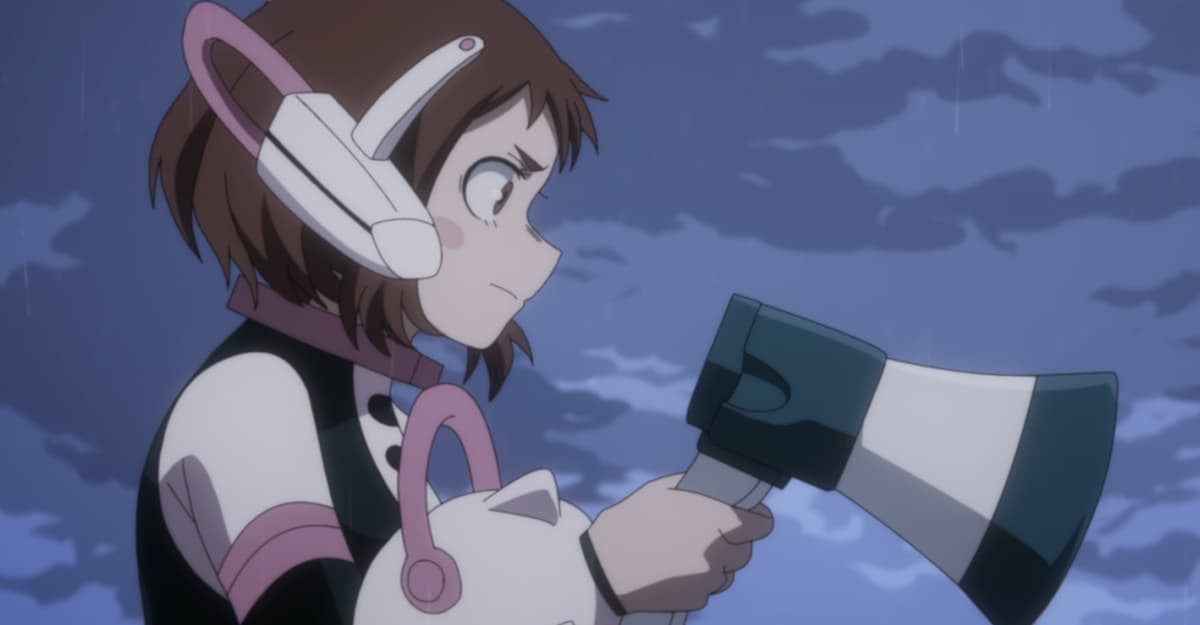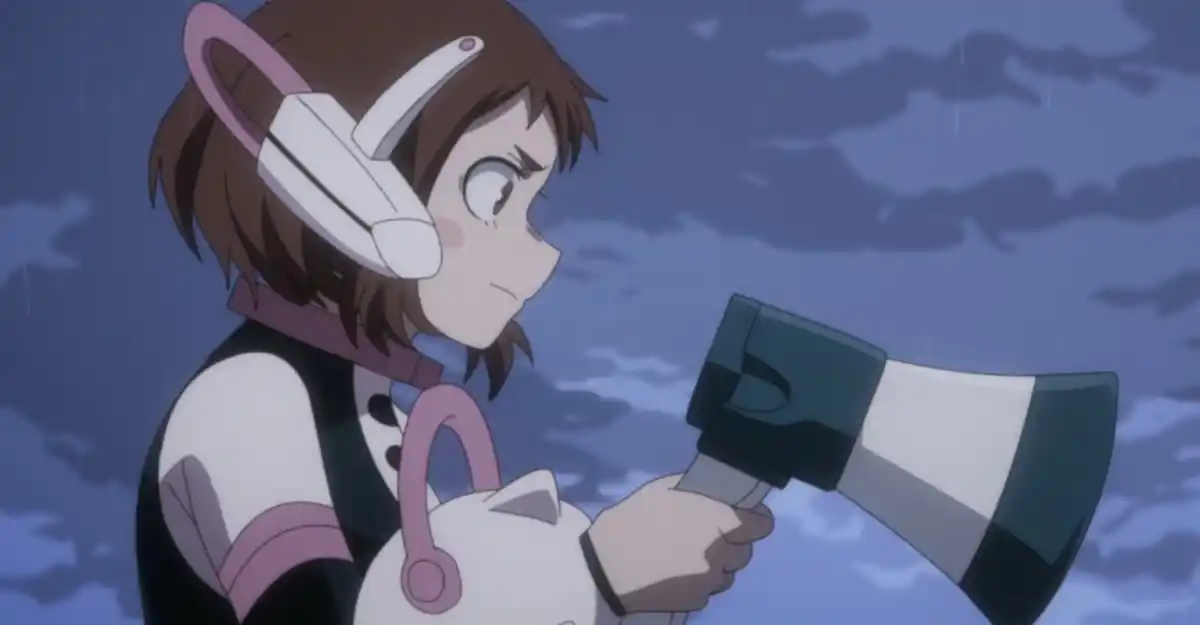
Major spoilers for My Hero Academia season 6, cour 2 below!
The second cour of My Hero Academia‘s sixth season has been one hell of an emotional ride. With the deterioration hero society, the shounen series has let its darker themes take center stage. And it’s wearing them beautifully. The second half of the cour in particular has had gut punch after gut punch. Episode 136, for example, featured an amazing piece of character development six seasons in the making. And then, there’s episode 137, “A Young Woman’s Declaration,” which delivered a difficult, resonant, and emotional lesson. I believe that lesson is vitally important right now in the real world.
Ochaco Uraraka’s speech is the hardest I’ve cried all season. I was cradling a lovely afternoon tea in my hand, and I had to put it down because I was crying that much. It was a brilliant moment in the context of the series. A huge emotional dam was released for many characters and plot points all at once. But the whole episode also poked at something I’ve been thinking about a lot in recent months: how we conduct our public discourse.
Broken systems in ‘MHA’ and beyond
There’s a fair amount of resonance between the real world and how My Hero Academia has begun to re-frame the hero system. In MHA, hero society regularly ignores people who don’t “fit in” with the hero system’s image. Many of those who feel ostracized become villains. As Lady Nagant’s story showed, law enforcement hastily dubs anyone suspicious the “problem,” often with fatal consequences which are swept under the rug. It’s a brutal circle.
As former TMS writer Briana Lawrence wrote eloquently on Crunchyroll’s blog, our protagonists are slowly realizing that the ideals they inherited don’t actually translate to reality. As the broken nature of the current societal “givens” become evident and stirs up public unrest, transforming these systems becomes the work of the younger generations. To go beyond, if you will.
Indeed, as Uraraka herself says, public sentiment in My Hero Academia right now is like a bomb set to explode. MHA‘s Japan was suddenly thrown into lawless chaos by from brutal losses by the heroes. Cities are unsafe and in ruins, and most citizens have been evacuated to shelters. As normal people scramble to readjust their entire lives, they become understandably distrustful of heroes and other authority figures. They’re mad, they’re skeptical, they’re scared. We’ve seen a lot of protests. We’ve even seen stubborn anti-hero holdouts and vigilantes, who would rather take their chances on their own than come back into “the system.”
MHA shows the workings behind public discourse
As the backlash to heroes has gotten stronger, the general public itself has become something of a character in My Hero Academia‘s sixth season. Rumors circulate like wildfire as people try to figure out what’s happening, what they’re not being told, and how to defend themselves. Because the possibility of a life-endangering event occurring is always present, people are on edge. They’re thinking defensively and too freaked out to think rationally.
Many of the civilians in My Hero Academia are looking for somewhere to place the blame. One convenient place to place that blame is Izuku. In “A Young Woman’s Declaration,” the people sheltering at UA are faced with Izuku in the flesh, just as they learn he’s the one All For One is after. As a result, their anger very nearly boils over. In response, for a moment, they almost look like monsters to an overwhelmed and guilt-ridden Izuku.
The episode quietly and deliberately shows us what’s helping to fuel this mob’s furiocity. One man is shown watching a YouTube video speculating on Izuku’s identity. The most vocal and stubborn member of the crowd is revealed, at the end of the scene, to have just been looking at Twitter. We watch in real time as the most vocal members of the mob—the ones on social media—work up everyone else. The people who know better are too overwhelmed by the furor to think critically or act.
Fortunately, “A Young Woman’s Declaration” offers an answer on how this kind of toxic mass mindset can be calmed down.
The extra step
At the beginning of “A Young Woman’s Declaration,” Principal Nezu (who is apparently a Quirk morality philanthropist?!!) says, “Lack of understanding … Intolerance … They both occur when people who can’t take that extra step to get closer to others act or move and crowd together. Taking that extra step is a hard path.”
I already thought that was plenty heavy. But then the episode provides an example of that next step. UA professors and heroes had tried to explain to those sheltering at UA why Izuku was coming, but that only made the crowd angrier. They have a role to play in the situation and system the crowd is upset with, after all. It turns out, someone younger was needed. And Uraraka stepped the hell up. (Notably, Uraraka messed up a critical chance to reach out to Himiko Toga in season six, cour 1. A brief flashback alludes to the fact that, in this speech, Uraraka realizes her mistake.)
Uraraka has to work hard to win over the mob. She explains that Izuku’s power is “meant to defeat All For One,” why he left, and why they brought him back. And then, she says the turning point: “He left, but do you know what he looks like now? … Will you please look at him?!” She encourages a pause. She encourages a simple action which serves at the starting point for empathy. Because Izuku looks like shit. This pause immediately winds the crowd down and makes them more receptive to what she has to say.
Uraraka continues to have a back and forth with the crowd, addressing their concerns honestly. “Can I reassure you right now?! Sorry, I can’t. Because we’re also uneasy. Because we’re neighbors, just like you all … So please lend him your strength! So that we can smile together in the future! With all of your power—please, will you let him rest beside you?!”
And that’s it, right there. Someone has to make that first step, to reach out. But it’s the collective which is able to create a better future. We all, individually, have that power to make that extra step. And that all adds up. With these words, two individuals who support Izuku burst forth from the mob to embrace him.
Forgetting humanity in symbols
The waves of anger within the assembled crowd are steadying, but—of course—there’s still hesitancy. A random guy entreats the crowd from within it. “Before blaming him hysterically, can’t we listen to what he has to say?” Again, the entreaty to pause!
Someone protests by saying Izuku could just go to another facility. The woman behind him points out the same thing would happen there—a point whose legitimacy is immediately conceded.
The first man speaks again, realizing a truth about how he’s perceived the world. “I felt like I was in the audience, and the heroes were the performers on stage. One day, an extraordinary hero named All Might showed us what heroes were like … And then before we knew it, we had forgotten the soul behind the man … I know it’s tough, but think about this calmly. How long are we going to stay audience members?”
Especially when engaging via internet discourse, I think we all have a tendency to forget to forget the humanity of the people on our screens. Including celebrities and public figures. We all have an active part we can play in improving that discourse.
Back to the real world
I have been thinking about the role anger plays in public discourse a lot. I left the country for four months last year and engaged on social media selectively while I was gone (nerd stuff, ya know). When I started engaging again, I realized how much of social media discourse, politics, and clickbait fuels itself on anger and finger-pointing. And I started noticing how that was adversely affecting my friends and myself, even away from our phones.
Sarah Silverman did a really excellent piece during her tenure on The Daily Show on the “economy of anger.” I believe it ties in with this My Hero Academia episode very deeply.
For my part, I have been trying to write my own articles in a way which maximizes empathy and minimizes any polarized finger-pointing. I promise to you, dear reader, I will continue to try to improve.
“A Young Woman’s Declaration” is a guidebook on the best practices of what to do when you feel like you’re getting riled up. Take a pause, consider the humanity of the other person, and try to empathize with them. I realize this is often exhausting, and that more often than not, only one side is willing to put in the work. In that case, I still encourage the pause. I’ve also been personally loving the power move of “not engaging.”
My Hero Academia takes place in a fictional world. But I am a deep believer in the power of fiction to make us reflect on ourselves and the world around us. There’s a lot of real world parallels here. If enough people take that extra step, we’ll all be in a much better position. After all, this episode ends by subverting the narrative goal we thought we’ve been heading towards since episode one. Izuku says, “This is the story of how I became the greatest hero. And it’s the story of how everyone became the greatest heroes.”
(Featured image: Bones)
Have a tip we should know? [email protected]
